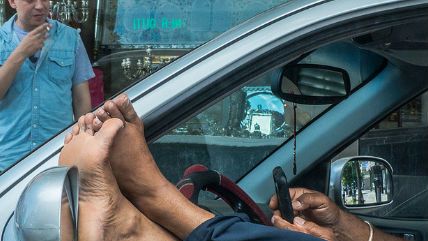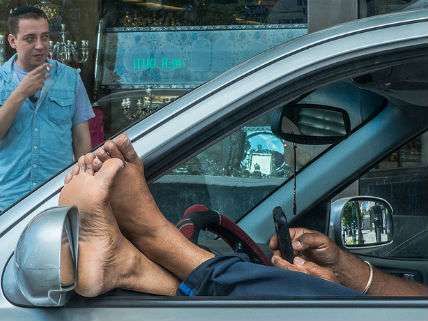New Round of Fearmongering Over Texting and Driving
Fatal accidents down over recent years, and distracted driving makes up a small portion of those.


If you went by the breathless reporting on texting and driving, or the word of law enforcement or "traffic safety advocates" you'd think at any given moment someone is careening to their death because they or another driver had their eyes on their cellphones and not on the road.
The latest entry comes from the AP with the headline "Police Losing Battle to Get Drivers Down to Put Down Their Phones". Police around the country are handing out tickets ranging between $20 and $500 (Lousiana), according to the AP, but say they can't catch everyone on a cellphone because it's so prevalent. Cops use bicycles, tractor trailers, and even dress as homeless people to catch drivers using cellphones while theirs cars are moving or while they're stopped at red lights or stop signs. Fortunately some states, like Florida, treat texting and driving as a secondary offense so police won't stop you merely for that infraction.
The AP, and the police officers they spoke to, doesn''t offer much in the way of statistics to back the assertion that texting and driving is such a big problem vis a vis traffic accidents. The AP quotes data from the National Highway Traffic Safety Administration (NHTSA) which estimates 3,500 people died in crashes involving distracted drivers in the U.S. and Puerto Rico in 2015, with 476 of those being drivers who use their cellphone. The AP also notes that safety advocates question those numbers because of the self-reporting involved.
Let's take a look at wider numbers. According to the Pew Research Center, nine out of ten Americans now own a cellphone and nearly two thirds own a smartphone. Data from The Wireless Association, meanwhile, shows more than 300.5 million cellphone subscribers in the U.S. in 2010, up from 109.5 million in 2000 and 340,000 in 1985, the first year for which the association has data. In the same time periods, fatal traffic accidents have been down. According to the NHTSA, in 2014 there were just under 30,000 fatal crashes, down from just over 30,000 in 2010 and about 37,500 in 2000. The drops are more significant when taking into account miles driven and the number of drivers on the road, and the scope of the problem is a lot smaller. In 2014, there were 1.08 fatalities per 100 million miles travelled, down from 1.11 in 2010 and 1.53 in 2000. There were 15.26 fatalities per 100,000 licensed drivers in 2014, 15.71 in 2010 and 22 in 2000.
Some of this, of course, has to do with technological advancements that have made cars safer to drive. But the numbers don't support the idea that smartphones are contributing to a rise in traffic fatalities, nor the contention that catching so-called distracted drivers ought to be a high law enforcement priority. Auto safety experts have warned about the obsession over texting and driving before; in short, the theory goes that cellphones are just replacing previous driving distractions (like reading a newspaper, doing your make-up, or eating breakfast) rather than adding to them. But an industry has sprouted up surrounding the idea that texting and driving is a grave problem; there's government money available to proselytize about it and of course a new revenue stream for law enforcement and local governments to exploit, and a new problem for them to demand more money for.


Show Comments (52)